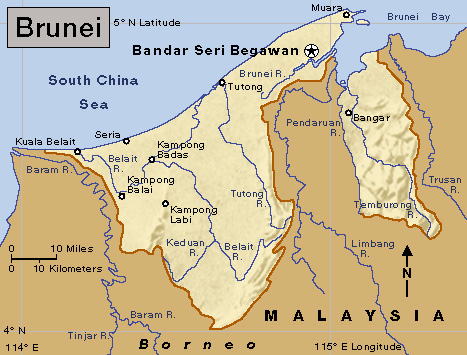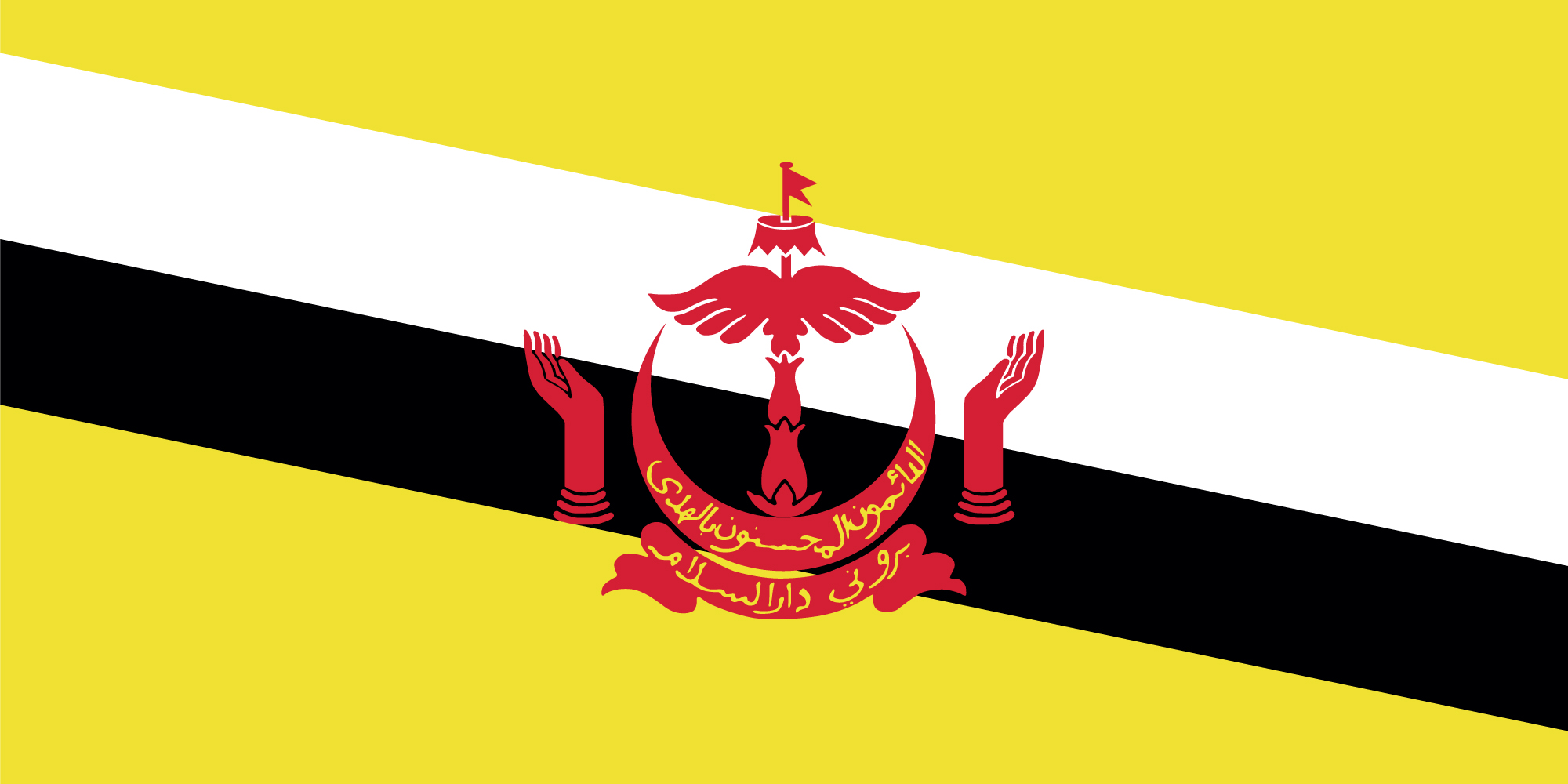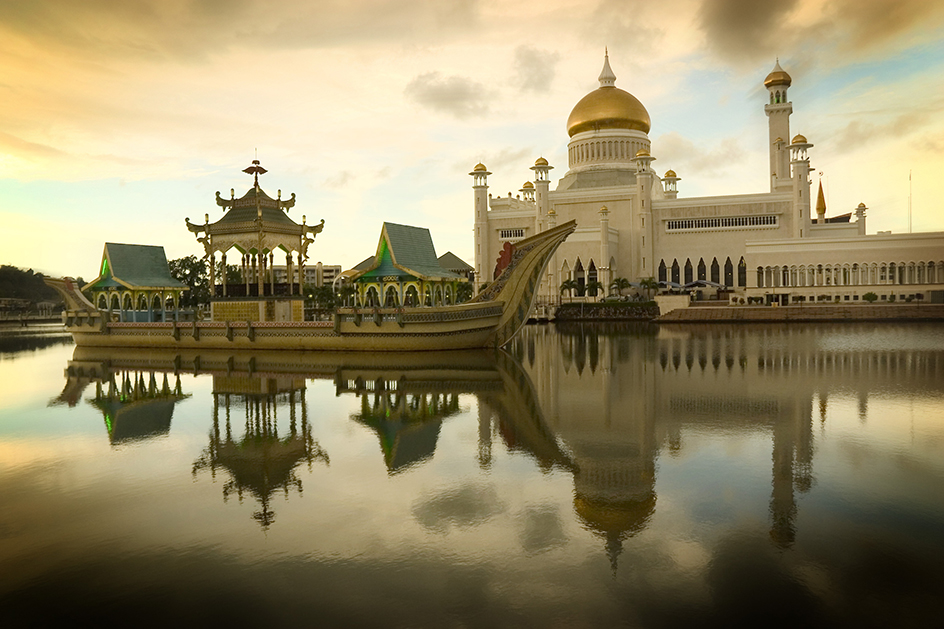Brunei << BROO ny or BROO nay >> is a small country in Southeast Asia. It lies on the north coast of the island of Borneo. The people of Brunei enjoy a high standard of living, mainly because of the country’s valuable offshore petroleum deposits. Brunei covers 2,226 square miles (5,765 square kilometers) and has a population of about 469,000. Its official name is Negara Brunei Darussalam, which means State of Brunei, Abode of Peace. Bandar Seri Begawan is its capital and largest city.

Brunei was a protectorate of the United Kingdom from 1888 to 1984, when it became an independent nation. The basic unit of money is the Brunei dollar.
Government.
Brunei’s government is headed by a monarch called a sultan. The sultan is chosen for life by a council of succession. Sultan Haji Hassanal Bolkiah, who has been the ruler since 1967, also serves as the country’s prime minister and minister of defense. Several members of his family hold high positions in the government. The sultan appoints 33 full members and 3 ex officio members to the council, which advises him on legislation.

Brunei is divided into four administrative districts for purposes of local government. Each has a district council. The sultan appoints the council members. Three of the districts—Belait, Brunei and Muara, and Tutong—lie along the northern coast of Borneo. The fourth district, Temburong, lies across Brunei Bay from the Brunei and Muara district and is separated from the rest of the country by a district of the Malaysian state of Sarawak.
Brunei’s highest court is the Supreme Court. It consists of a chief justice and several commissioners, who are appointed by the sultan.
People.
About 80 percent of Brunei’s people live in urban areas, and about 20 percent in rural areas. About two-thirds of the people are Malays. Chinese, the largest minority, make up about 11 percent of the population. The Dusun, Murut, and other native groups make up about 3 percent. Most Bruneians speak Malay, the official language, but English and Chinese are also used. Nearly all the Malays are Muslims. Most of the rest of the people are Buddhists or Christians. Some members of the native groups practice local traditional religions.

Most Bruneians in urban areas wear clothing similar to that worn by people in Western nations. But many Muslim women wear an outfit consisting of a long skirt and a long-sleeved blouse, and a head covering called a tudung. In rural areas, many men and women wear loose shirts and sarongs, which are long pieces of cloth worn as a skirt and tied at the waist. Many people in the cities live in modern houses or apartment buildings made of brick or stone. Most houses in the rural areas are wooden and have thatched roofs.
Bruneians enjoy a high standard of living. There is relatively little unemployment. The government provides free schooling, free medical services, and other benefits.
Most Bruneian children complete elementary school and many go on to high school. The first university in the country, the University of Brunei Darussalam, opened in 1985. Brunei also has teachers colleges and vocational schools. Many Bruneians study at foreign universities. The government pays for their education.
Land and climate.
Brunei borders the South China Sea on the north. The rest of Brunei is surrounded by Malaysia. Most of it is flat, and the interior is heavily wooded. The Brunei River flows through the capital. Brunei’s highest point, Bukit Pagon, rises 6,070 feet (1,850 meters) along the country’s eastern border with Malaysia in Temburong.
Brunei has a tropical climate with average monthly temperatures of about 80 °F (27 °C). Rainfall averages about 100 inches (250 centimeters) a year along the coast and about 125 inches (320 centimeters) inland.
Economy.
Crude oil, petroleum products, and liquefied natural gas account for most of Brunei’s economic production. However, the petroleum and gas industry employs only about 5 percent of the country’s labor force. Much of Brunei’s petroleum and gas is found offshore in the South China Sea.
Agriculture plays a small role in Brunei’s economy, and the country must import most of its food. The leading food crops include rice, fruits, and vegetables. Farmers raise cattle, chickens, and water buffalo. Aquaculture, the commercial raising of animals and plants that live in water, is important to Brunei. Blue shrimp is the most valuable product.
The country exports more than it imports. Crude oil and natural gas account for most of the export income. Brunei’s main imports include chemicals, food, machinery, and manufactured goods. The country’s chief trading partners include China, Japan, South Korea, and the countries of the Association of Southeast Asian Nations (ASEAN). Brunei also belongs to ASEAN, which is a regional organization that promotes economic, cultural, political, and social cooperation among its members. See Association of Southeast Asian Nations.
Brunei’s main port is Muara, northeast of Bandar Seri Begawan. The country’s only international airport, Brunei International Airport, lies just north of the capital.
History.
Archaeological evidence found near Brunei’s capital indicates that people have lived in the area since about the A.D. 600’s. The area is first mentioned in Chinese sources in the 800’s. By the 1100’s, Brunei had become a major trading kingdom.
After the fall of the trading port of Malay Melaka to the Portuguese in 1511, many Malays fled to Brunei. There, they became the basis of an influential trading community. During the 1500’s and 1600’s, Brunei’s kingdom expanded throughout the island of Borneo and through parts of the southern and central Philippines to as far north as Manila. After the Spaniards arrived in the area in 1565, they removed Bruneian rulers from most of the Philippines, but they failed to conquer Brunei itself. Throughout the 1700’s, vessels from Brunei attacked Spanish shipping and settlements in the Philippines.
Following the arrival of the British in the 1800’s, Brunei gradually lost its land to British interests until it was left with only a small piece of territory split in two by the state of Sarawak. In 1888, Brunei became a British protectorate. On Jan. 1, 1984, it became a fully independent nation.
